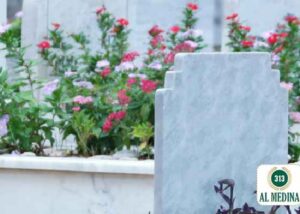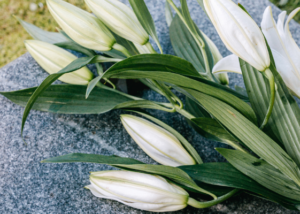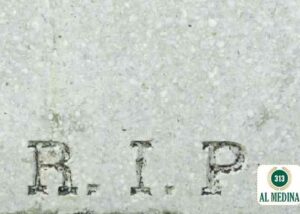Quran
Hadith
Islamic Text
Yes, it is wrong to burn incense sticks or Bukhoor at the grave. The Hanafi Madhab considers this to be Makruh.
عَنْ أَبِي هُرَيْرَةَ، عَنِ النَّبِيِّ صَلَّى اللهُ عَلَيْهِ وَسَلَّمَ قَالَ: لَا تُتْبَعُ الْجَنَازَةُ بِصَوْتٍ، وَلَا نَارٍ
Abu Hurairah (May Allah Most High be pleased with him) narrated that the Prophet ﷺ said, ‘A funeral procession should not be followed by loud voices or fire.’ (Sunan Abi Dawood 3171, Hasan Lighayrihi).
In the Hadith we find the Holy Prophet ﷺ discouraging us from following funerals with loud voices or fire. There is some difference of opinion regarding the Hadith above in terms of authenticity, Shaykh Shuayb Arnawut considered it to be Hasan Lighayrihi. Even if one believed it to be weak it can still be used to establish something Makruh (Tanzeehi), see the link below for details.
Hanafi scholars quoted the Hadith above in their books when they explained that it is Makruh to burn incense at graves. That includes Bukhoor and incense sticks. Unfortunately many Muslims are unaware of the Hadith and thus unaware of the legal ruling. Therefore, burning incense sticks or Bukhoor has become a widespread practice at Muslim graves.
وَلَا يُتْبَعُ بِنَارٍ إلَى قَبْرِهِ يَعْنِي الْإِجْمَارَ فِي الْقَبْرِ. (المبسوط)
Fire should not be taken to his grave, meaning burning incense at the grave. (Imam al-Sarakhsi, al-Mabsoot).
يكره الإجمار بالنار عند القبر واتباع الجنائز بها. (البناية شرح الهداية)
It is Makruh to burn incense at the grave, or to follow a funeral procession with it. (Imam Badr al-Deen al-Ayni, al-Binayah).
يُكْرَهُ الْإِجْمَارُ بِالنَّارِ عِنْدَ الْقَبْرِ وَاتِّبَاعِ الْجِنَازَةِ بِهَا. (تبيين الحقائق شرح كنز الدقائق)
It is Makruh to burn incense at the grave, or to follow a funeral procession with it. (Imam Fakhr al-Deen al-Zayla’i, Tabyeen al-Haqaaiq).
وَجَمِيعُ مَا يُجَمَّرُ فِيهِ الْمَيِّتُ ثَلَاثٌ: عِنْدَ خُرُوجِ رُوحِهِ لِإِزَالَةِ الرَّائِحَةِ الْكَرِيهَةِ وَعِنْدَ غُسْلِهِ وَعِنْدَ تَكْفِينِهِ، وَلَا يُجَمَّرُ خَلْفَهُ وَلَا فِي الْقَبْرِ؛ لِمَا رُوِيَ: لَا تُتْبِعُوا الْجِنَازَةَ بِصَوْتٍ وَلَا نَار. (فتح القدير)
Incense is burned around the deceased in three places only. When his soul exits, in order to remove the repulsive smell. When washing him, and when shrouding him. Incense is not burned behind him (in the funeral procession), nor at the grave. This is due to the narration, ‘A funeral procession should not be followed by loud voices or fire.’ (Imam Ibn al-Humaam, Fath al-Qadeer).
وَجَمِيعُ مَا يُجَمَّرُ فِيهِ الْمَيِّتُ ثَلَاثُ مَوَاضِعَ عِنْدَ خُرُوجِ رُوحِهِ لِإِزَالَةِ الرَّائِحَةِ الْكَرِيهَةِ وَعِنْدَ غُسْلِهِ وَعِنْدَ تَكْفِينِهِ، وَلَا يُجَمَّرُ خَلْفُهُ، وَلَا فِي الْقَبْرِ. (البحر الرائق شرح كنز الدقائق)
Incense is burned around the deceased in three places only. When his soul exits, in order to remove the repulsive smell. When washing him, and when shrouding him. Incense is not burned behind him (in the funeral procession), nor at the grave. (Imam Zayn al-Deen Ibn Nujaym, al-Bahr al-Raiq).
يُكْرَهُ الْإِجْمَارُ عِنْدَ الْقَبْرِ وَاتِّبَاعُ الْجِنَازَةِ بِالنَّارِ. (منحة الخالق)
It is Makruh to burn incense at the grave, or to follow a funeral procession with it. (Imam Ibn Abideen, Minhatu al-Khaliq).
فَهِيَ ثَلَاثٌ لَا خَلْفَهُ وَلَا فِي الْقَبْرِ
(قَوْلُهُ: فَهِيَ ثَلَاثٌ إلَخْ)
قَالَ فِي الْفَتْحِ وَجَمِيعُ مَا يُجَمَّرُ فِيهِ الْمَيِّتُ ثَلَاثٌ عِنْدَ خُرُوجِ رُوحِهِ لِإِزَالَةِ الرَّائِحَةِ الْكَرِيهَةِ، وَعِنْدَ غُسْلِهِ وَعِنْدَ تَكْفِينِهِ، وَلَا يُجَمَّرُ خَلْفَهُ، وَلَا فِي الْقَبْرِ، لِمَا رُوِيَ: لَا تَتْبَعُوا الْجِنَازَةَ بِصَوْتٍ وَلَا نَارٍ. (رد المحتار على الدر المختار)
Imam al-Haskafi: So they are three. Not behind him (in the funeral procession), nor at the grave.
Imam Ibn Abideen: His saying, so they are three. In Fath he said, incense is burned around the deceased in three places only. When his soul exits, in order to remove the repulsive smell. When washing him, and when shrouding him. Incense is not burned behind him (in the funeral procession), nor at the grave. This is due to the narration, ‘A funeral procession should not be followed by loud voices or fire.’ (Radd al-Muhtaar).
ولا تتبع الجنازة بصوت ولا نار ويكره تجمير القبر. (مراقي الفلاح شرح متن نور الإيضاح)
A funeral procession is not to be followed with loud voices or fire. It is Makruh to burn incense at the grave. (Imam Hasan bin Ammar al-Shurunbulali, Maraaqi al-Falah).
And Allah Most High Knows Best.
-Answered by Shaykh Noorud-deen Rashid (04.11.2022)
See also:
What do the Hadith gradings mean?
Is it permitted to build on graves according to the Hanafi Madhab?
Se also video:






